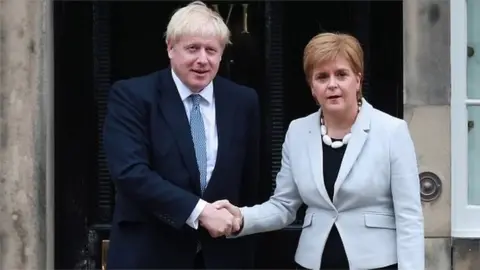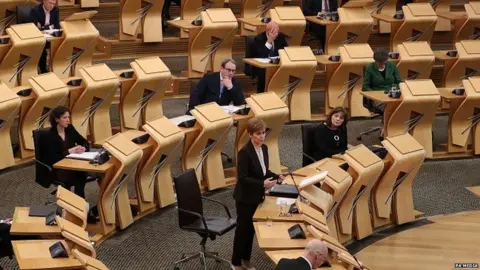Boris Johnson 'called Scottish devolution disaster'
 EPA
EPABoris Johnson has come under fire for reportedly telling a virtual meeting of Conservative MPs that devolution had been a "disaster" in Scotland.
Mr Johnson also reportedly described it as predecessor Tony Blair's "biggest mistake".
The SNP and Labour have both criticised the prime minister.
But Communities Secretary Robert Jenrick said Mr Johnson has "always supported devolution".
"What he does feel strongly, and I would agree, is that devolution in Scotland has facilitated the rise of separatism and nationalism in the form of the SNP, and that that's trying to break apart the United Kingdom," he told BBC Breakfast.
"Anybody, like the prime minister, who loves the UK wants to keep it together thinks that that's a very, very dangerous and disappointing outcome that we need to battle against."
Mr Johnson was in a Zoom meeting with Tory MPs representing dozens of seats in northern England on Monday when he is said to have made the remarks.
The Sun newspaper reported the PM had told the MPs "devolution has been a disaster north of the border".
SNP MP Drew Henry said the prime minister's comments "underline the contempt that Boris Johnson and the Scottish Tories have for the people of Scotland".
Speaking on BBC Breakfast he said: "Effectively what they are saying is it's alright for Scotland to have devolution as long as they vote for the Westminster party we want them to."

What is devolution?
Devolution is the name for the way powers once held by the government in Westminster have been passed to elected groups in Scotland, Wales and Northern Ireland.
Devolved powers include health, housing, fire services, some areas of transport and education. However, Scotland has always had its own education system and a separate legal system.
The UK government, based in London, has kept many powers, such as defence, foreign policy and most forms of tax.
Public votes about devolution were held in 1997 in Scotland and Wales, and in both parts of Ireland in 1998, as part of the Good Friday Agreement. It led to the creation of the Scottish Parliament, the National Assembly for Wales and the Northern Ireland Assembly.
Some parts of England have directly-elected mayors, who also have devolved powers. The mayor of London, for example, is responsible for transport and policing in the capital.

Former Prime Minister Tony Blair's Labour government brought in devolution for Scotland in 1999, including the setting up of a parliament in Edinburgh.
A Downing Street source said: "The PM has always supported devolution, but Tony Blair failed to foresee the rise of separatists in Scotland.
"Devolution is great - but not when it's used by separatists and nationalists to break up the UK."


This comes six months before vital elections right across the UK, important particularly in Scotland, just when the SNP has been starting to warm up its campaign, and just when discussions about how the UK government ought to respond are taking place too.
It is one thing - and, of course, legitimate - for political rivals to criticise each other. But to suggest the way that Scotland has been run for more than a decade is a "disaster" is quite another.
And the worry among Scottish Tories is the implication that Boris Johnson's understanding of the political situation is far from complete.

Scottish Conservative leader Douglas Ross insisted the prime minister "believes in devolution", adding: "I'm saying very clearly devolution is not the problem."
In an interview with BBC Scotland, Mr Ross said: "The problem has been the SNP government's obsession with separating Scotland from rest of the UK.
"My efforts are focused on holding the SNP government to account, because they have failed.
"Any other discussion is a distraction from the key aim that we have to do to improve services right across the country.
"These are all services that the SNP have been in charge of and in control of for thirteen and half years."
Holyrood elections in May
Elections for the Scottish Parliament take place next May. The SNP is currently the largest party with 61 MSPs and the Conservative Party is the second-largest with 31 - eight seats ahead of Labour.
Ms Sturgeon's SNP says a second referendum on independence - following Scotland's vote against it in 2014 - should happen if her party wins. But Mr Johnson has ruled this out.
In response to Mr Johnson's reported remarks to Tory MPs, Scotland's First Minister Nicola Sturgeon tweeted: "Worth bookmarking these PM comments for the next time Tories say they're not a threat to the powers of the Scottish Parliament - or, even more incredibly, that they support devolving more powers."
 PA Media
PA MediaShe added that the "only way to protect and strengthen" the Scottish Parliament was through independence for Scotland.
But the leader of the Scottish Conservatives, Douglas Ross, tweeted: "Devolution has not been a disaster. The SNP's non-stop obsession with another referendum - above jobs, schools and everything else - has been a disaster."
Scottish Labour leader Richard Leonard said the "Neanderthal" reported remarks made by the PM "expose the underlying thinking and philosophy in Downing Street".
He told BBC News the comments were "reminiscent of the voices of Thatcherism and Majorism of the 1980s and 1990s, which were steadfastly opposed to devolution".
"In my view, what Boris Johnson is doing is defying the popular will of the people of Scotland, and I don't think that's a very good place for any prime minister to be in."
Liberal Democrat MP Alistair Carmichael, who served as Scottish secretary during the coalition government, said Boris Johnson "is not making it easier to resist the demands for another independence referendum".
He added that the prime minister was a "bigger threat to the continuation of the United Kingdom than Nicola Sturgeon or Alex Salmond could ever hope to be".
It has been suggested by some taking part in the MPs' Zoom meeting that Mr Johnson was answering a question that had been put to him about devolution in England.
